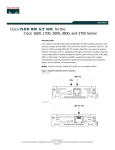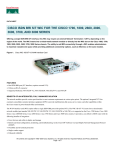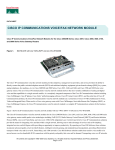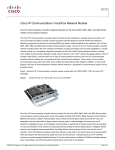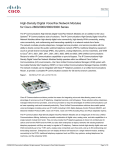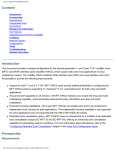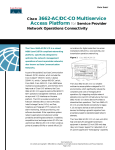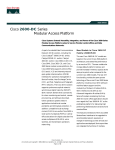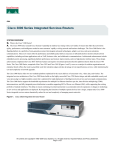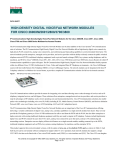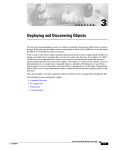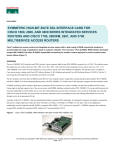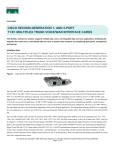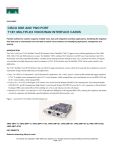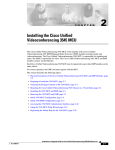Download Cisco 2-Port RJ-48 Multiflex Trunk - E1 with drop & insert
Transcript
Understanding 1-Port and 2-Port E1 Multiflex Trunk Voice/WAN Interface Cards (VWICs) Contents Introduction Prerequisites Requirements Components Used Conventions Product Numbers Features Multiple Channel Groups on One Port Configuration Platform Support Digital Voice Port Pinout (RJ-48C) NetPro Discussion Forums - Featured Conversations Related Information Introduction The Cisco 1-Port and 2-Port E1 Multiflex Voice/WAN Interface Card (VWIC-xMFT-E1, VWIC-xMFT-G703, and VWIC-2MFT-E1-DI) supports voice and data applications on the Cisco 1700, 2600, 3600, and 3700 series routers. Prerequisites Requirements There are no specific requirements for this document. Components Used The information in this document is based on these software and hardware versions: ● VWIC-1MFT-E1 ● VWIC-2MFT-E1 ● VWIC-2MFT-E1-DI ● VWIC-1MFT-G703 ● VWIC-2MFT-G703 Conventions Refer to Cisco Technical Tips Conventions for more information on document conventions. Product Numbers Product Number Product Description VWIC-1MFT-E1 1-Port RJ-48 Multiflex Trunk - E1 VWIC-2MFT-E1 2-Port RJ-48 Multiflex Trunk - E1 VWIC-2MFT-E1-DI 2-Port RJ-48 Multiflex Trunk - E1 with drop and insert VWIC-1MFT-G703 1-Port RJ-48 Multiflex Trunk - E1 for unstructured G.703 VWIC-2MFT-G703 2-Port RJ-48 Multiflex Trunk - E1 for unstructured G.703 Note: NM-HD-1V and NM-HD-2V do not support these VWICs. Note: Neither NM-HDV nor NM-HD-2VE supports the VWIC-1MFT-G703; only NM-HDV2 supports the VWIC-1MFT-G703. NM-HDV and NM-HDV2 support the VWIC-2MFT-G703; but the NM-HD-2VE does not support the VWIC-2MFT-G703. Features Note: The 1-Port and 2-Port E1 Multiflex Trunk VWICs are not like the T1 channel service unit/data service unit (CSU/DSU) (WIC-1DSU-T1). You can use this multiflex trunk as a voice interface card (VIC) or as a WAN Interface Card (WIC) (in a WIC slot in the 1700, 2600, 3600, or 3700). Therefore, the multiflex trunk is a VWIC. The multiflex trunk provides physical layer E1 access. The host into which you plug the E1 interface determines the E1 interface capabilities. ● When you use the multiflex trunk in a high-density voice network module, each digital service zero (DS0) time slot can contain voice calls. The voice network module, and not the multiflex trunk, determines the E1 signaling capability (E1 R2, ISDN PRI). ● Each multiflex controller can support either one ISDN PRI or E1 channel associated signaling (CAS) or E1 R2 signaling. The reason for this limitation is that each of these signaling types uses the same time slot (16) for trunk signaling. ● If you set up the card to use ISDN PRI signaling, there is no support for ISDN data connection. The card cannot terminate ISDN 64K or 56K data connection; the card only supports voice-call termination with ISDN PRI signaling. ● The multiflex trunk, with or without a high-density voice network module, cannot terminate a modem connection on the router. ● When you use the multiflex trunk in the WIC slot of the 2600, you can configure each E1 into a single channel group as a serial interface. ● The 3600 NM-1E2W, NM-1E1R2W, and NM-2E2W support one serial channel group per WIC slot. Therefore, there is no support for the VWIC-2MFT-E1. Support is available for the VWIC-2MFT-E1-DI, but with one serial channel group. ● The NM-1FE2W, NM-1FE1R2W, NM-2FE2W, and NM-2W support two serial channel groups per WIC slot. Therefore, support is available for VWIC-2MFT-E1. Support is available for VWIC-2MFT-E1-DI with two serial channel groups. The drop-and-insert feature enables the removal of DS0 time slots from one E1 interface and insertion into time slots of the other E1 interface. This feature is available in VIC and WIC applications. If you configure drop-and-insert, ensure that the E1 framing under the controllers involved (the tdm-groups configuration location) is the same. If you use different frame types, proper understanding of the signaling bits fails. This failure occurs during the drop of a channel from one controller and insertion into a channel from another controller. Drop-and-insert time slots do not need to be contiguous. ● The VWIC-MFT-E1 receiver operates in a short haul mode and can recover a 20-decibel (dB) attenuated signal. In order to translate this to an accurate cable length, you need to know the cable attenuation characteristics. Typical cable attenuation for .4 millimeter (mm) wire is 3 dB per 100 meter (m) (measured at 1024 kilohertz [KHz]). So the maximum cable length for this card is approximately 600 m. This value includes a 3 dB margin. ● Bit error rate tester (BERT) support requires Cisco IOS® Software Release 12.1(1)T or later. ● V.54 loopback requires Cisco IOS Software Release 12.1(1)T or later. Note: The 2-port E1 Multiflex Trunk VWICs has only one shared clocking domain between the two E1 controllers. So, if both E1 controllers are configured to derive clocking from the line, the clock references received must be synchronous. Otherwise, timing slips will occur on at least one of the controllers. If the clocking sources are pleisochronous and one controller is configured for "clock source line primary" and the other for "clock source line", it is likely the second controller will exhibit controlled slips in the output of the "show controllers E1" command. This behaviour is a hardware limitation of the 2-port E1 Multiflex Trunk VWIC product and is by design. However, independent clocking sources can be supported on the 2-port T1/E1 VWIC2 product when both controllers are used for data-only purposes. Multiple Channel Groups on One Port ● Two channel groups on one port require Cisco IOS Software Release 12.1(1)T or later on the 2600. Two channel groups on one port require Cisco IOS Software Releases 12.1(2)X, 12.1(3)T, or later on the 3620, 3640, and 3660. ● Support is available for two channel groups on one port in Cisco 2600 chassis WIC slots. This support is not available on NM-1E2W, NM-2E2W, or NM-1E1R2W, but is available on NM-1FE2W, NM-2FE2W, NM-1FE1R2W, and NM-2W. ● When you have enabled the two-channel group mode, the WIC slot supports only one physical port. The two-channel group mode still supports add/drop multiplexing because only one port terminates on the router. Configuration Note: Configuration of the E1 multiflex trunk ports is not like the T1 CSU/DSU WIC (WIC-1DSU-T1). Configure the E1 multiflex trunk ports as controller e1 slot/port , which is similar to the channelized E1/ISDN PRI network module. For the configuration of voice features in Cisco IOS Software, refer to Configuring Voice over IP for the Cisco 3600 Series. Note: The commands to configure VoIP on Cisco routers are very similar on all the router platforms (see the Platform Support section of this document). For the configuration of voice features in Catalyst OS (CatOS) on a Cisco Catalyst 4000, refer to Configuring Voice Interfaces. Platform Support Cisco IOS Software Support 1721 Carrier Module Not Required 1751/1760 VG200 2600 Not NM-HDV Chassis Required WIC Slot NM-2W 2600XM, 2650XM NM-HDV 12.2(8)YJ5 12.2(4)YB4 12.1(3)T 12.0(5)XK 12.0(7)T 12.1 12.1T 12.2 12.2T 12.0(7)XK 12.0(7)XK 12.1(1)T 1 12.1(2)T 12.2, 12.2 12.2T 12.2T 12.2(8)YJ5 12.2(4)YB4 12.1(3)T 12.0(5)XK 12.1 12.1T 12.2 12.2T 12.0(7)XK 12.0(7)XK 12.1(1)T 1 12.1(2)T 12.2 12.2 12.2T 12.2T VWIC-2MFT-E1-DI 12.2(8)YJ5 12.2(4)YB4 12.1(3)T 12.0(5)XK 12.1 12.1T 12.2 12.2T 12.0(7)XK 12.0(7)XK 12.1(1)T 1 12.1(2)T 12.2 12.2 12.2T 12.2T VWIC-1MFT-E1 VWIC-2MFT-E1 VWIC-1MFT-G703 12.2(8)YJ5 12.2(4)YB4 12.1(1)T Not 12.2 supported 12.2T 12.1(1)T 12.2 12.2T Not supported Chassis WIC Slot 12.1(14) NM-1FE2W, NM-1E2W, NM-1FE1R2W, NM-2W NM-HDV2 NM-HDV NM-HD-2VE NM-1E1R2W, NM-HDV NM-HD-2VE6 NM-2FE2W, NM-2E2W 2 NM-2W 12.2(8)T1 12.2(15)ZJ 12.0(5)XK 12.0(7)T 12.1 12.1T 12.2 12.2T 12.0(7)XK 12.1(1)T 12.2 12.2T 12.0(7)XK 1 12.1(2)T 12.2 12.2T 12.2(15)ZJ 12.2(15)ZJ Not supported 12.0(7)XK 12.1(1)T 12.2 12.2T 12.0(7)XK 1 12.1(2)T 12.2 12.2T 12.2(15)ZJ 12.2(15)ZJ 12.0(5)XK 3 12.0(7)T 12.1 12.1T 12.2 12.2T 12.0(7)XK 12.1(1)T 12.2 12.2T 12.0(7)XK 1 12.1(2)T 12.2 12.2T 12.2(15)ZJ Not 12.1(1)T 12.2 Not supported supported 12.2T 12.1(1)T 12.2 12.2T Not supported Not supported 12.2(8)T1 12.3(7)T 12.2(12) 12.2(12) 12.1(14) 12.2(8)T1 12.2(12) 12.2(8)T1 12.3(7)T 12.2(12) 12.2(12) 12.2(12) 12.1(14) 12.2(8)T1 12.2(8)T1 12.3(7)T 12.2(12) 12.2(12) 12.2(12) 12.2(8)T1 12.2(8)T1 12.3(11)T 12.2(12), 3620, 3640, 3660 12.2(12) 12.0(7)XK1 VWIC-2MFT-G703 12.2(8)YJ5 12.2(4)YB4 12.1(3)T 12.1(1)T 12.2 12.2T 12.1(1)T 12.2 12.2T 12.0(7)XK1 12.1(2)T 12.2(8)T1 12.2(8)T1 12.2 12.2(12), 12.2(8)T1 12.3(7)T 12.2(12) 12.2T Not supported Not supported 12.2(12) 12.1(1)T 12.2 12.2Td 12.1(2)T Not supported 12.2 12.2T 1 Support is available on Cisco IOS Software Release 12.0(5)XK, ISDN PRI with Q Signaling (QSIG) only. 2 Support is available on 3660 with NM-1E1R2W, NM-1E2W, or NM-2E2W in any Cisco IOS Software Release. 3 Support is available for only one serial channel group. 4 No support is available in 1750. Cisco 1751 and 1760 support only voice applications in Cisco IOS Software Release 12.2(4)YB. Support for data and/or voice applications requires Cisco IOS Software Release 12.2(8)YJ. 5 No support is available in 1710 or 1720. Data-only support is available for the 1721. 6 Cisco 3620 series routers do not support NM-HD-2VE. Cisco IOS Software Support Carrier Module 2691, 3725, 3745 3631 Catalyst 4000 NM-1FE2W, Chassis Chassis WS-X4604 NM-1FE1R2W, NM-HDV2 NM-HDV NM-HD-2VE WIC WIC AGM NM-2FE2W, Slot Slot NM-2W VWIC-1MFT-E1 All All Cisco IOS Cisco Software IOS Software releases releases VWIC-2MFT-E1 All All Cisco IOS Cisco Software IOS Software releases releases All All Cisco IOS Cisco VWIC-2MFT-E1-DI IOS Software Software releases releases All All Cisco IOS Cisco VWIC-1MFT-G703 IOS Software Software releases releases All All Cisco IOS Cisco VWIC-2MFT-G703 IOS Software Software releases releases 12.2(15)ZJ All Cisco 12.1(3a)XI IOS Software releases 12.2(15)ZJ All Cisco 12.1(3a)XI IOS Software releases 12.2(15)ZJ All Cisco 12.1(3a)XI IOS Software releases 12.3(7)T All Cisco IOS Software releases 12.3(7)T All Cisco IOS Software releases 12.3(7)T All Cisco IOS Software releases 12.3(11)T All Cisco Not Not Not supported IOS supported supported1 Software releases 12.3(7)T All Cisco IOS Software releases1 All Cisco Not Not supported IOS supported Software releases Note: These Cisco IOS Software releases are typically the minimum releases that you need to support the platform, module, or feature in consideration. For a complete list of Cisco IOS Software releases that support a feature, module, interface card, or chassis, refer to the Software Advisor ( registered customers only) tool. 1 NM-HDV does not support the 1-port G.703 card. The NM-HDV only supports the VWIC-2MFT-G703. Digital Voice Port Pinout (RJ-48C) Pin Signal 1 Receive (Rx) Tip 2 Rx Ring 3 Not used 4 Transmit (Tx) Tip 5 Tx Ring 6 Not used 7 Not used 8 Not used For additional information on cable pinouts, refer to the Cable Connectors and Pinouts section of User's Guide for Cisco IPVC 3520 Gateway Release 2.0. Note: Pinout of the RJ-48C receptacles on the multiflex trunk card occurs at the customer premises equipment (CPE), rather than at the central office equipment. Use a T1/E1 crossover cable to connect to other CPE pinned out devices (for example, PBXs). NetPro Discussion Forums - Featured Conversations Networking Professionals Connection is a forum for networking professionals to share questions, suggestions, and information about networking solutions, products, and technologies. The featured links are some of the most recent conversations available in this technology. NetPro Discussion Forums - Featured Conversations for Voice Service Providers: Voice over IP Voice & Video: Voice over IP Voice & Video: IP Telephony Voice & Video: IP Phone Services for End Users Voice & Video: Unified Communications Voice & Video: IP Phone Services for Developers Voice & Video: General Related Information ● Understanding High Density Voice Network Modules ● Voice Hardware Compatibility Matrix (Cisco 17xx, 26/36/37xx, VG200, Catalyst 4500/4000, Catalyst 6xxx) ● Connecting Voice Interface Cards to a Network ● Voice Technology Support ● Voice and IP Communications Product Support ● Recommended Reading: Troubleshooting Cisco IP Telephony ● Technical Support & Documentation - Cisco Systems All contents are Copyright © 2006-2007 Cisco Systems, Inc. All rights reserved. Important Notices and Privacy Statement.





